Prepare to conquer the Unit 7 AP Psychology Test with this captivating guide! We’ll delve into the intricacies of the exam, exploring its content areas, question types, and test-taking strategies. Embark on this journey to unlock your potential and achieve test day success.
Delving into the heart of Unit 7, we’ll unravel the key content areas, delving into the depths of each topic and concept. From the complexities of cognition and memory to the intricacies of social psychology, no stone will be left unturned.
Introduction
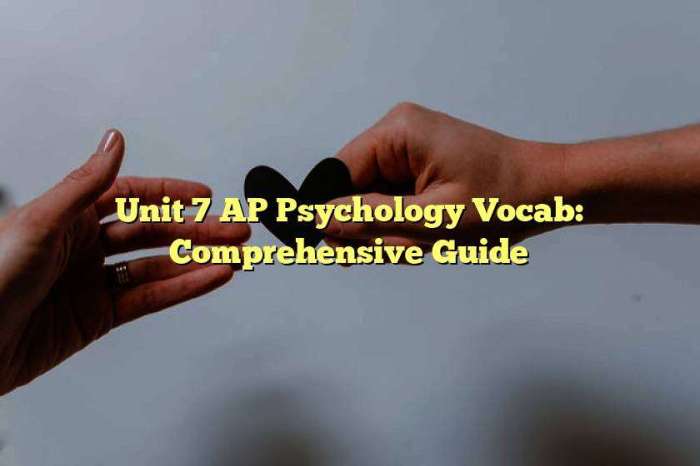
The AP Psychology Test is a standardized exam designed to assess students’ knowledge and understanding of the field of psychology. The test is divided into two sections: a multiple-choice section and a free-response section. The multiple-choice section consists of 100 questions, while the free-response section consists of two essay questions.
The purpose of the AP Psychology Test is to measure students’ ability to apply psychological principles to real-world situations. The test also assesses students’ critical thinking skills and their ability to communicate their ideas effectively.
Format of the Test
The AP Psychology Test is a three-hour exam. The multiple-choice section is 75 minutes long, and the free-response section is 105 minutes long.
The multiple-choice section consists of 100 questions. Each question is worth one point. The questions are divided into four content areas: biological bases of behavior, cognitive processes, learning, and motivation and emotion.
The free-response section consists of two essay questions. Each question is worth 15 points. The questions are designed to assess students’ ability to apply psychological principles to real-world situations and to communicate their ideas effectively.
Content Areas: Unit 7 Ap Psychology Test
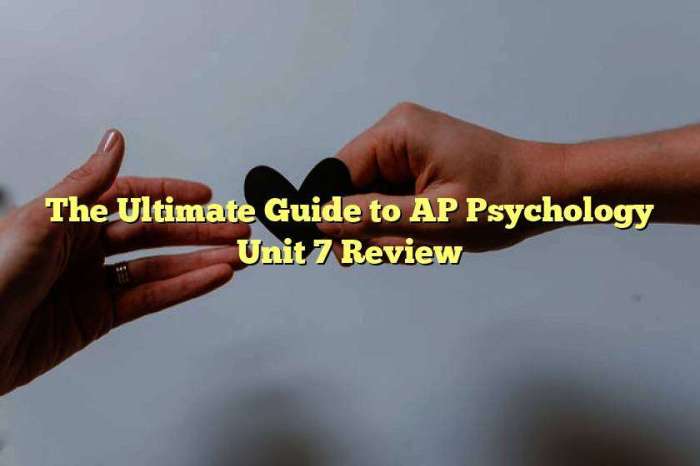
Unit 7 of AP Psychology encompasses a comprehensive range of topics within the fields of developmental and social psychology. These areas delve into the multifaceted nature of human growth, behavior, and interactions.
Within the realm of developmental psychology, the unit explores the cognitive, emotional, and social development of individuals from infancy to adolescence. It examines the various theories and research findings that shed light on the processes and factors that shape human development during these formative years.
Physical and Cognitive Development
- Key concepts of physical and cognitive development in infancy, childhood, and adolescence.
- The role of genetics, environment, and interaction in shaping development.
- Motor skills, language acquisition, and cognitive abilities at different developmental stages.
Social and Emotional Development
- Socialization processes and the development of self-concept.
- Attachment theory and its implications for social and emotional development.
- Moral development and the role of culture and society.
In the realm of social psychology, the unit focuses on the influence of social situations and relationships on human behavior. It examines the psychological processes that underlie social interactions, such as conformity, obedience, prejudice, and aggression.
Social Cognition
- The role of schemas, stereotypes, and attitudes in social cognition.
- Attribution theory and how we explain the behavior of others.
- Social comparison and its impact on self-esteem.
Social Influence
- Conformity and obedience to social norms and authority figures.
- The power of persuasion and the factors that influence it.
- Prejudice and discrimination: causes and consequences.
Test Structure
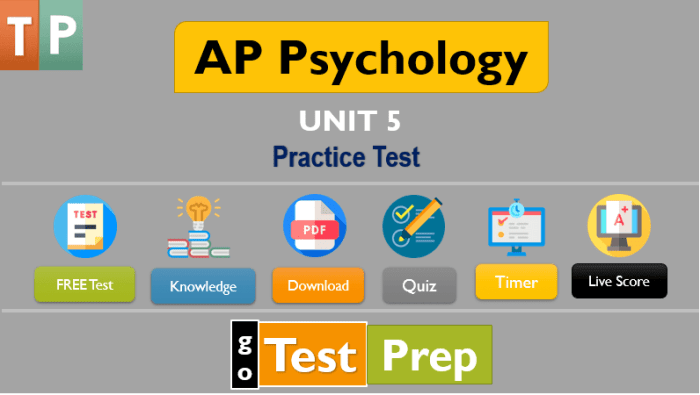
The Unit 7 AP Psychology test comprises multiple sections designed to assess students’ understanding of the content. These sections are allocated specific time slots, ensuring a comprehensive evaluation of various psychological concepts.
Section 1: Multiple Choice
The multiple-choice section consists of 50 questions that test students’ knowledge of core psychological principles, theories, and research findings. Each question presents several answer choices, and students must select the most accurate or appropriate option. This section is allotted 50 minutes, allowing ample time for careful consideration and analysis.
Section 2: Free Response
The free-response section includes two essay questions that require students to demonstrate their ability to synthesize and apply psychological concepts to real-world scenarios. Each question presents a specific psychological issue or concept, and students must provide a well-structured and evidence-based response.
This section is allotted 50 minutes, providing sufficient time for thoughtful analysis and comprehensive writing.
Section 3: Document-Based Question (DBQ)
The DBQ section presents students with a historical document or research article related to a psychological topic. Students must analyze the document, identify key psychological concepts, and explain how the document contributes to our understanding of the topic. This section is allotted 50 minutes, ensuring ample time for careful analysis and insightful interpretation.
Question Types
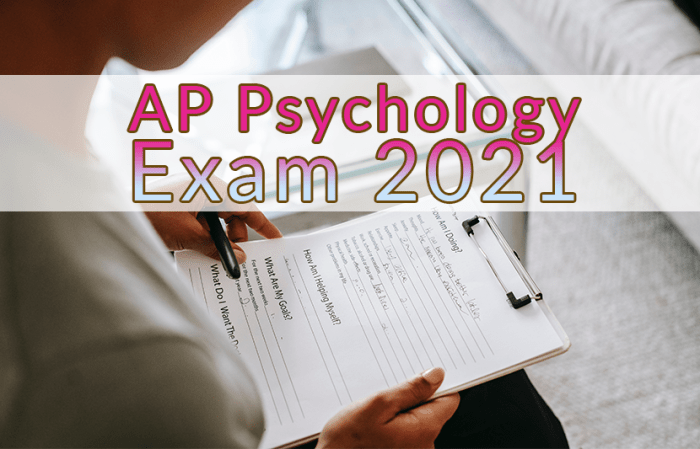
The AP Psychology test for Unit 7 includes various question types designed to assess your understanding of the material. Each question type has its unique approach and requires specific strategies to answer effectively.
The following are the common question types you can expect on the exam:
Multiple Choice Questions
- Multiple-choice questionspresent a stem that poses a question or presents a scenario, followed by several options labeled with letters (A, B, C, D, or E). Only one option is correct.
- To approach multiple-choice questions, read the stem carefully and identify the key concept or issue being addressed.
- Read each option thoroughly, eliminating any that are clearly incorrect or irrelevant.
- Consider the remaining options and select the one that best answers the question or fits the scenario.
Free Response Questions
- Free response questionsrequire you to provide written answers that demonstrate your understanding of the concepts and your ability to apply them.
- These questions can range from short answer to essay-length responses.
- When answering free response questions, ensure you address the specific question being asked.
- Organize your answer logically, using clear and concise language.
- Support your claims with evidence from the course material or real-life examples.
Data-Based Questions
- Data-based questionspresent data in various forms, such as graphs, charts, or tables.
- You will be asked to analyze the data, draw conclusions, and make predictions based on the information provided.
- When approaching data-based questions, take time to examine the data carefully.
- Identify the trends, patterns, or relationships within the data.
- Use your understanding of psychological concepts to interpret the data and answer the question.
Research Design Questions
- Research design questionsassess your knowledge of the different types of research methods used in psychology.
- You will be asked to identify the strengths and weaknesses of various research designs.
- When answering research design questions, consider the purpose of the research, the population being studied, and the variables being investigated.
- Evaluate the design based on its ability to control for bias, ensure internal and external validity, and produce reliable and generalizable results.
Test-Taking Strategies
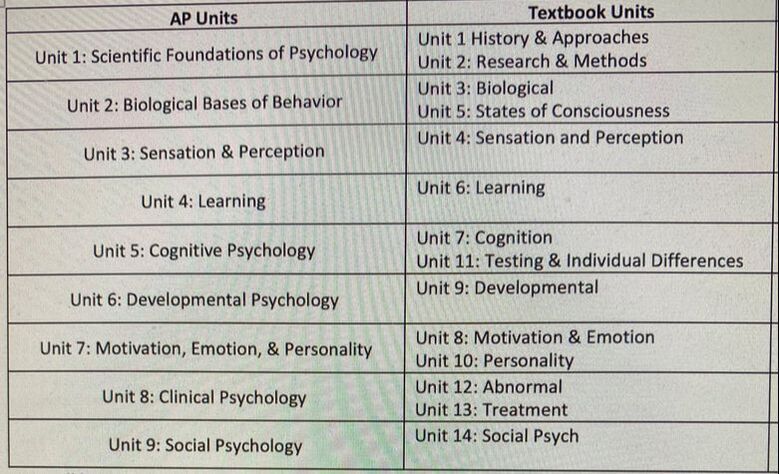
Effective preparation and test-taking strategies can enhance your performance on the unit 7 AP Psychology test. Time management, question selection, and answering techniques play crucial roles in maximizing your score.
Time Management
- Allocate time wisely:Divide the available time among the sections based on their point values and your strengths.
- Monitor your pace:Keep track of the time and adjust your speed accordingly to avoid running out of time.
- Utilize breaks:Take short breaks during the test to clear your mind and refocus.
Question Selection, Unit 7 ap psychology test
- Start with easier questions:Begin with questions you are confident about to build momentum.
- Identify high-point questions:Prioritize questions that carry more weight in terms of points.
- Eliminate incorrect answers:Cross out options that you can eliminate, narrowing down your choices.
Answering Techniques
- Read questions carefully:Pay attention to s and instructions to avoid misinterpretations.
- Write clearly and concisely:Use clear and concise language in your responses.
- Support your answers with evidence:Provide specific examples and theories to support your claims.
- Manage stress:Practice relaxation techniques and stay calm during the test to maintain focus.
Sample Questions
Practice questions provide an opportunity to test your understanding of the concepts covered in Unit 7. Here are a few sample questions that you may encounter on the AP Psychology test, along with answer keys or explanations to help you grasp the correct responses.
Biological Bases of Behavior
The biological bases of behavior involve the study of how biological processes influence psychological functioning. Questions in this area may explore topics such as the structure and function of the nervous system, the role of neurotransmitters, and the impact of genetics on behavior.
- Question:Which neurotransmitter is associated with feelings of pleasure and reward?
- Answer:Dopamine
- Explanation:Dopamine is a neurotransmitter that plays a crucial role in the brain’s reward system, contributing to feelings of pleasure and motivation.
- Question:What is the name of the brain structure that is responsible for regulating sleep and wakefulness?
- Answer:Hypothalamus
- Explanation:The hypothalamus is a small region of the brain that controls various physiological functions, including sleep-wake cycles, hunger, and thirst.
Sensation and Perception
Sensation and perception involve the processes by which we receive and interpret sensory information from the environment. Questions in this area may examine topics such as the different senses, sensory thresholds, and the role of attention in perception.
The Unit 7 AP Psychology test covers a wide range of topics, including pain perception. One important concept to understand is the Eula Biss pain scale, which provides a framework for measuring the intensity of pain. Eula Biss’s pain scale is a multidimensional tool that considers both the sensory and emotional aspects of pain.
Understanding this scale can help students better grasp the complexities of pain perception, which is crucial for the Unit 7 AP Psychology test.
- Question:Which of the following is NOT a type of sensory receptor?
- Answer:Neuron
- Explanation:Sensory receptors are specialized cells that convert sensory stimuli into electrical signals, while neurons are cells that transmit these signals throughout the nervous system.
- Question:What is the phenomenon known as “sensory adaptation”?
- Answer:The gradual decrease in sensitivity to a constant stimulus
- Explanation:Sensory adaptation occurs when our senses adjust to ongoing stimuli, allowing us to focus on more relevant or changing sensory information.
Resources
Preparing for the unit 7 AP Psychology test requires dedication and access to quality resources. Here’s a comprehensive list of resources to help you succeed:
Websites
- College Board AP Psychology Course:Official website with course information, practice questions, and sample tests.
- Khan Academy AP Psychology:Free video lessons, practice exercises, and diagnostic quizzes.
- Crash Course Psychology:Animated videos covering key concepts and theories in psychology.
Textbooks
- Myers’ Psychology for AP:Comprehensive textbook with detailed explanations and real-world examples.
- Barron’s AP Psychology:Focused review book with practice questions and full-length practice tests.
- Princeton Review AP Psychology Premium Prep:In-depth study guide with practice questions, flashcards, and online resources.
Study Guides
- AP Psychology Exam Secrets:Comprehensive study guide with practice questions and test-taking strategies.
- SparkNotes AP Psychology:Concise study guide with summaries, key concepts, and practice questions.
- 5 Steps to a 5: AP Psychology:Step-by-step study guide with practice questions and online resources.
FAQ Explained
What is the format of the Unit 7 AP Psychology Test?
The test consists of 60 multiple-choice questions and 2 free-response questions.
How much time is allocated for each section of the test?
You will have 45 minutes for the multiple-choice section and 75 minutes for the free-response section.
What are some effective test-taking strategies?
Read the instructions carefully, manage your time wisely, and answer the questions you are most confident about first.